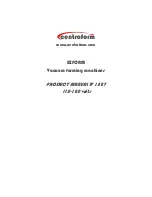
FB-EV 028 GA für TW 600-602.doc
Technische Änderungen vorbehalten (Stand: 31.03.2016)
GB
- Universal torque ratchet − instruction manual
Ratchet no. 1000600, 1000601, 1000602 (10-70 Ncm)
1. Application
Torque ratchet for inserting and removing dental screws with a defined torque. The torque function can also be “blocked”; the blocked position
enables greater torque to be transferred when placing implants, and allows connections to be loosened. The torque ratchet may only be used by
trained dental specialists.
2. Handling
Prosthesis adjustment – function of torque: Application by using the bending rod. The torque will be read by means of the bending rod on the scale.
The requested torque will be achieved when the middle of the
bending rod will be covered with the appropriate scale
graduation mark.
ATTENTION: Reading should always be done directly from the
top.
When the desired torque has been achieved, please relieve the
bending rod again. Then, the bending rod will spring back into
the starting position.
Surgical adjustment – blocked function: Use the torque without the bending rod.
Attention: The torque should not be charged over 100 Ncm.
Turning Grip
3. Switching over of the direction of rotation:
•
pull the turning grip
•
turn half way the turning grip
•
release the turning grip
4. Exchanging of the tools
Pull the turning grip, then the tools can be taken out i.e. can be used. Then release the turning grip. Now, the tools can be used from both sides. If
necessary, switch over the direction of rotation.
5.
Preparation
5.1 Treatment instructions/warnings
To avoid damage, do not use metal brushes or cleaning sponges.
Only use cleaning and disinfectant solutions with a pH value of between 4.5 and 10. Follow the manufacturer’s instructions (e.g., intended purpose,
dosage, exposure period and replacement of the solution).
The ratchet is not sterile when delivered and must be cleaned and sterilised before it is used.
When using several torque ratchets, do not interchange the individual parts. Each individual part belongs to the respective instrument.
Damaged products must go through the reprocessing process before being returned for repair.
5.2 Restriction regarding repreparation
The end of the product’s service life is normally determined by wear and damage caused during use and by incorrect handling.
5.3 Preparations for cleaning
For cleaning the torque can be disassembled without any tool. Please unscrew the screw completely. Then, the entire ratchet can be taken out.
Screw
Turning Grip
Spring
Pawl
Clean the parts under cold running water using a soft brush to remove all visible soiling. Ensure that all openings and cavities are thoroughly rinsed.
Do not allow blood and other soiling to dry on.
5.4 Cleaning and disinfection: Manual
Ultrasonic cleaning bath: Place the parts into a wire basket and ensure that the parts do not touch, in order to avoid acoustic shadows. Clean for 3
minutes in an ultrasonic cleaning bath (35-40 kHz) at a temperature of 40°-50°C with an enzymatic cleaning solution. Ensure that the parts are
completely immersed in the water, without the formation of any bubbles. Rinse with clear, cold water; if possible, use deionised water. Dry the parts
with a lint-free cloth and blow dry with compressed air.
5.5 Cleaning and disinfection: Automatic, Cleaning and disinfection device:
Securely apply the cleaned ratchet parts to the carrier. Do not overload the carrier. Start the program. After rinsing, chemical cleaning starts at 40°-
60°C. Residues from the cleaning process must be reliably removed in the subsequent rinsing phase. Avoid damage to the material from
neutralising reagents. Thermal disinfection is achieved at 90°-95°C. The subsequent treatment with deionised water is followed by adequate drying.
Remove the ratchet parts from the device immediately after the program ends.
The process/method has been validated report 0908.0715.
5.6 Maintenance, inspection and testing
Allow the parts to cool to room temperature and visually inspect them for residues of proteins and other soiling. If necessary, repeat the preparation
steps.
Lightly lubricate the areas marked with using contra-angle handpiece oil. Assemble ratchet and carry out functional test.
5.7 Sterilisation packaging
Place the ratchet into packaging suitable for sterilisation according to ISO 11607 and EN 868. The bag must be large enough for the instrument.
Closures must not be under tension.
5.8 Sterilisation
Method: Fractionated pre-vacuum process in accordance with ISO 17665
Temperature: heating to 134°C, max. 137°C
Pressure: 3 pre-vacuum phases with a minimum pressure of 60 millibars
Holding period: 5 minutes
Drying time: at least 10 minutes
After sterilisation, inspect the sterile packaging for damage and check sterilisation indicators.
5.9 Place of use
Immediately after use, the products must put in cold water (<40 ° C). Use no hot water (> 40 ° C) or cleaning agents, as this may cause fixation of
residues on the product (risk of protein coagulation (denaturation)), which can affect the success of the subsequent processing steps.
6. Storage
Store the ratchet at a moderate temperature, and in a dry, dust-free, well-ventilated place, in which there is no corrosive steam.
7. Calibration
We recommend annual calibration of the ratchet. The ratchet must be cleaned and sterilised before shipping, otherwise the product will be returned.
8. Further information
The preparer is responsible for ensuring the desired details: using the equipment, materials and personnel. The process must be validated and
routine monitoring of the process is required with used equipment.
Further information on the preparation of medical devices at
www.rki.de
or
www.a-k-i.org
9. Manufacturer
Josef Ganter Feinmechanik GmbH, Niedereschacher Straße 24, D-78083 Dauchingen
Tel. (049)-(0)7720/4474, Fax (049)-(0)7720/61264 www.josefganter.de -
Legend
Follow instruction for use
CE mark
REF
Item number
Non sterile




















